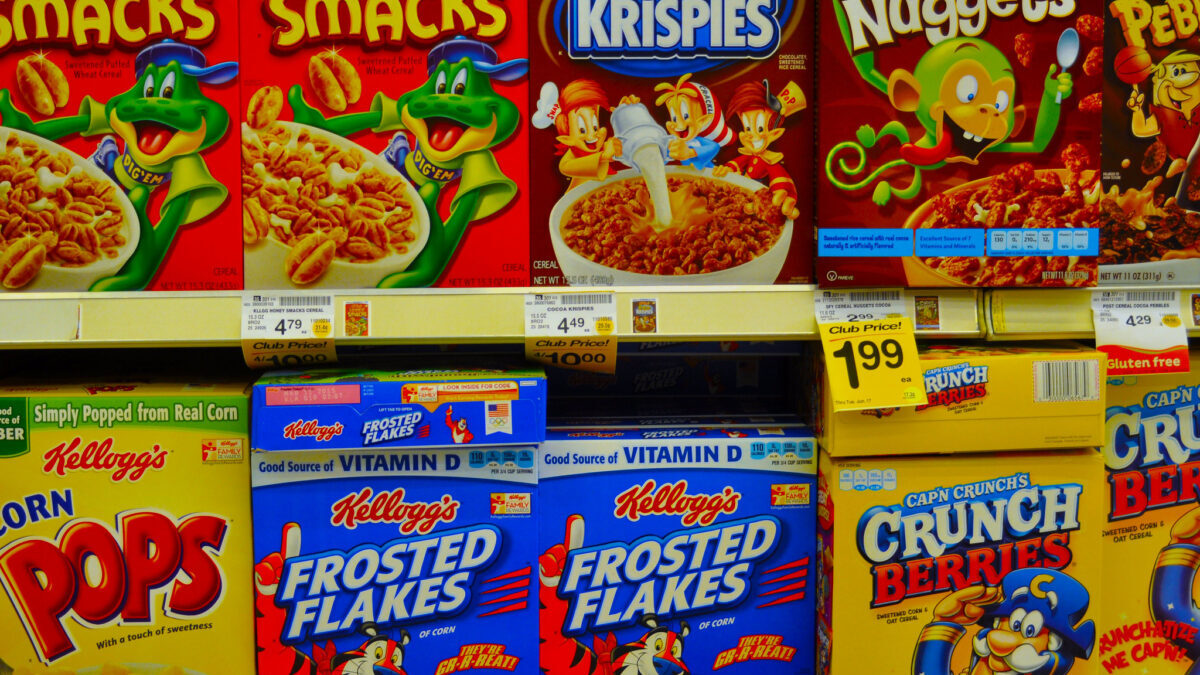At this point, it should be common sense that boxes of sugary, processed cereals are the furthest one can get from a healthy breakfast. Major food manufacturers behind Fruity Pebbles, Froot Loops, and Lucky Charms are threatening to sue so they can label their processed products “healthy” anyway.
Last fall, the Food and Drug Administration (FDA) proposed new guidelines on what may define a product as “healthy” to warrant the label on packages.
“Nutrition is key to improving our nation’s health,” said Health and Human Services Secretary Xavier Becerra in an agency press release. “Healthy food can lower our risk for chronic disease. But too many people may not know what constitutes healthy food. FDA’s move will help educate more Americans to improve health outcomes, tackle health disparities and save lives.”
The FDA’s current definition, established in 1994 and updated in 2016, allows food companies to label their products “healthy” if any amounts of total fat, saturated fat, cholesterol, and sodium are below a certain limit. The foods also must provide at least 10 percent of daily recommended values for vitamin A, vitamin C, calcium, iron, protein, or dietary fiber. No limits exist, however, for added sugar.
The existing regulations have allowed cereal companies to advertise boxes of chemically processed grains drenched in sugary syrups as “healthy.” The new guidelines, however, would put salmon on the roster of healthy products while barring the label for most cereals. Foods like cereals with more than 2.5 grams of sugar per serving would be prohibited from being labeled as “healthy.” According to Business Insider, the average box of cereal contains nearly 20 grams of sugar per typical serving.
“In response, processed food companies that produce a variety of snacks, baked goods, pastas, and frozen pizzas are challenging the rules before they are finalized by the agency,” the Intercept reported Wednesday. “Among the most vocal food companies are producers of high-sugar cereals, which are largely marketed to children and have been criticized as a driver of the obesity epidemic in America.”
Ten years after First Lady Michelle Obama’s “Let’s Move” campaign, childhood obesity has only gotten worse.
According to the Centers for Disease Control and Prevention (CDC), nearly 20 percent of children aged 2-19 — or 1 in 5 — were categorically obese between 2017 and 2020. Researchers who analyzed data from the Children’s Hospital of Philadelphia and published their findings in May 2021 concluded the prevalence of obesity rose among those aged 2-17 throughout the ineffective lockdowns that politicians claimed were necessary to combat Covid-19. Another paper from the Pennington Biomedical Research Center in Baton Rouge, Louisiana in June 2021 found cases of type 2 diabetes among children doubled under lockdown. Sales of packaged foods spiked at the same time.
Big pharma has responded to the unhealthy food and lifestyle crisis by proposing a cocktail of injections and surgeries.
In February, researchers at London’s Imperial School of Public Health concluded that processed food could actually be deadly. After analyzing data from nearly 200,000 middle-aged adults over roughly a decade, researchers found diets high in ultra-processed foods such as popular cereals were linked to higher rates of cancer and mortality.
According to the Intercept on Wednesday, food giants behind Fruity Pebbles and Lucky Charms argued in a joint filing to the FDA that “sugary cereals pose no health risks and are, in fact, beneficial to society and childhood health.”
“The companies stated that they view the ‘extremely strict’ guidelines as ‘alarming’ because ‘cereal is one of the most affordable, nutrient dense breakfast choices a person — adult or child — can make … with a wide range of options to suit different cultures, preferences, and taste,'” the outlet reported.
In 2004, Luise Light, a former USDA insider who was one of the original creators of the outdated food pyramid, warned, “Ultimately, the food industry dictates the government’s food advice, shaping the nutrition agenda delivered to the public.”
“In fact, to the food industry, the purpose of food guides is to persuade consumers that all foods (especially those that they’re selling) fit into a healthful diet,” she added.









